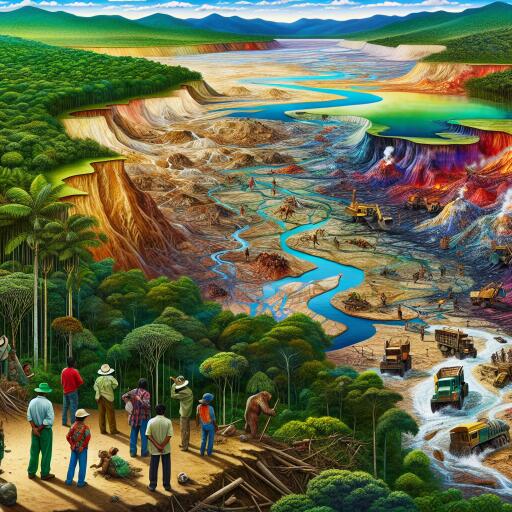
The Environmental Impact of Illegal Mining in Latin America
Latin America is facing a significant and growing environmental crisis, deeply linked to the surge in illegal mining operations across the region. Once dominated by drug and arms trafficking, criminal organizations have now turned to gold mining as a less risky and more lucrative operation, primarily due to the global increase in gold prices over recent years. This shift has profound implications not only for the environment but also for local communities and indigenous populations, whose lands and livelihoods are being threatened.
The allure of gold has transformed it into the modern-day equivalent of cocaine in Latin America, dubbing it the “new cocaine” for its profitability and ease in laundering proceeds. Illegal mining now generates an estimated annual revenue of up to $48 billion for criminal enterprises. This lucrative black market has led to widespread environmental degradation, including deforestation, ecosystem poisoning, and the endangerment of protected species, fundamentally altering the landscape of affected regions.
Illegal mining, as defined by regulatory violations, encroachment on protected areas, and the use of prohibited substances, poses unprecedented environmental and social challenges. Beyond causing vast environmental damage, it jeopardizes animal and human life, disturbs indigenous communities, and undermines legal economies and public health. Gold’s demand, significantly fueled by the jewelry industry, private investments, central banks, and technology sectors, has incited a damaging gold rush in Latin America.
As miners dig deeper into forested areas, the loss of biodiversity and the introduction of harmful substances like mercury into waterways have become alarming trends. Mercury, used to extract gold, has catastrophic effects on ecosystems and human health, contaminating rivers and lands and thereby affecting thousands of people living downstream.
Protected regions and indigenous lands are not spared, with territories designated for their ecological and cultural importance being overrun by illegal operations. The deforestation rate in these areas, particularly the Amazon basin, has skyrocketed, contributing significantly to global climate change. Criminal groups operating these mines bring violence, exploit local communities, and fund further illicit activities, magnifying the crisis.
Efforts to counteract illegal mining have seen varied success. Government interventions, like Brazil’s recent crackdown on illegal miners in Yanomami territory and collaborative international operations across borders, showcase the commitment to tackling this issue. However, the challenge remains daunting with persistent enforcement difficulties and the constant threat of the return of operations following government action.
Moreover, initiatives such as the PlanetGOLD program aim to introduce safer, more environmentally friendly mining practices. By promoting mercury-free technologies and formalizing small-scale mining, the program seeks to mitigate the environmental impact of gold mining and disrupt the cycle of illegal activities. These combined efforts underline the importance of a multi-faceted approach that includes law enforcement, community engagement, and international cooperation.
Despite the significant hurdles, the push against illegal mining is an essential battle in the broader fight for environmental preservation and sustainable development in Latin America. It calls for a concerted effort from local governments, international bodies, communities, and individuals alike to reclaim and protect the region’s precious natural resources. If left unchecked, the legacy of illegal mining could irreversibly damage one of the world’s most vital ecological and cultural treasures.
With a critical eye on the future, addressing the root causes and consequences of illegal mining remains a key issue on the international agenda. As nations forge ahead with strategies to combat this phenomenon, the hope is for a turnaround that secures not only the conservation of biodiversity in Latin America but also the rights and well-being of its indigenous peoples and local communities.





Leave a Reply